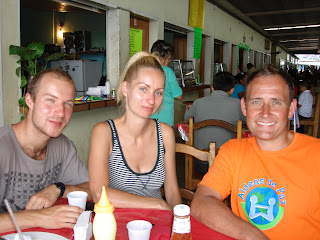Unsurprisingly, the couple of days after
Roraima were spent getting much needed rest and hungrily putting on
the kilograms I'd lost from my trek. In Santa Elena there is a little
road lined with cheap eateries and I'm beginning to get recognised by
a few of the owners due to my many visits which is a nice feeling. I
have developed a pretty impressive appetite while here and gained a
bit of a reputation with the others at the foundation which confuses
me since I've never thought of myself as a big eater and wasn't a hot
climate supposed to make you want to eat less? I can only put it down
to the tastiness of the food I encounter, or the mammoth portions mum
and grandma used to give me back home.
Returning from Roraima put me in a mixed mood
once again. I was exhausted but at the same time itching to begin
travelling in earnest. On Thursday night me and Barry spent the
evening having a few beers at Backpackers and as he gave me
recommendations for places to see in Peru and a vague plan for my
travelling months began to take shape I realised that I wanted to
start travelling as soon as possible. I was quietly pleased with the
level of communication I'd managed to achieve with our guide Omar
during the trek and although my Spanish is still in its infancy, I
definitely now have enough to hit the road and maybe even chat to/up
the locals.
Work at the foundation continues as usual
although my mind is now definitely elsewhere.
On sunday we headed for an all-you-can-eat meat
buffet over the border in Brazil and although a lot of the meat was
on the dry side, we devoured several plate-full's between us.
Afterwards, back in Venezuela we stopped at a bar, literally by the
side of the road, where there was live music and locals dancing. Me
and Barry lamented the lack of dancing culture in the UK while in
front of us locals, young and old alike, took to the floor for fast
paced meringue (or at least I think that's what its called). Few
middle aged women, and even less men, are on the thin side in
Venezuela but they could still move a fair bit and certainly put us
to shame. We reckoned the equivalent in the UK would probably be a
pub quiz.















